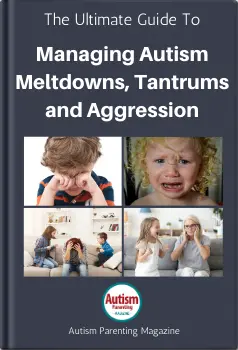As a father or mother of a kid with autism, maybe some of the difficult facets is when our youngster turns into angered or throws tantrums. Most of us have seen our youngsters locked in a bout of anger and frustration by which they can not appear to assuage themselves.
All of us have parenting instruments for managing autism anger and tantrums and serving to our youngsters overcome inconveniences. Further instruments can all the time enrich and strengthen these we already use.
Relying on our youngsters’s capability ranges, some could also be extra useful than others, as we have to tailor any interventions to our children and their particular person wants.
Listed below are some ideas for coping with and managing anger and tantrums with our autistic youngsters.
Obtain your FREE information on
Managing Autism Meltdowns, Tantrums and Aggression
1. Use a peaceful voice
Hearken to the voice of an airline pilot, and you’ll discover it’s all the time calm, clear, and unemotional. This, amongst different issues, portrays a way of calm and management to the passengers who’ve little management when they’re on a aircraft.
When flying, you might be placing your life within the pilot’s arms. Utilizing this voice when your youngster is offended helps them perceive clear communication and really feel a way of management and security.
2. Perceive that anger isn’t the only real emotion
If you see your youngster’s anger, it’s all the time with a number of different feelings. Anger isn’t the only real emotion in any singular state of affairs. As an example, in case your youngster calls a good friend who can not have a playdate, not less than two feelings are current—anger and disappointment.
Usually, anger and different feelings are like watercolors in that they have a tendency to mix and bleed collectively. Our job, as dad and mom, is to acknowledge our youngsters’s anger and spotlight the emotions beneath it by performing as an emotional mirror.
In different phrases, I would say to my youngster, “You appear unhappy and mad that your good friend canceled the playdate.”
3. Verify in the event that they’re drained, hungry, sick, or thirsty
Once we focus on sensory points, we frequently acknowledge sure textures, meals, and clothes to which our youngsters could also be notably delicate, creating irritability.
The identical goes for being drained, hungry, sick, and thirsty. Kids with sensory points are typically extra simply annoyed and angered by these points.

When potential, eradicate these points or attempt to place fewer calls for when they’re current.
4. Set guidelines and bounds
Anger is an appropriate and crucial emotion that helps our youngsters create boundaries and assert themselves. Nevertheless, guidelines should be utilized to this emotion. You can’t harm others or property together with your phrases or actions, even when offended.
Moreover, our youngsters must know they’re completely entitled to their anger however should attempt to give a motive (sooner or later) with potential concepts to unravel the issue.
It’s unacceptable to easily throw a tantrum or grow to be offended and never present concepts, if potential, to attempt to clear up the difficulty subsequent time.
5. Perceive that different issues can escalate or create tantrums
You will need to keep in mind that tantrums can not all the time be prevented, and we can not get down on ourselves when these points happen. That being stated, a number of issues can even create or escalate anger and tantrums.
Sensory overload
Merely having an excessive amount of visible, auditory, or different stimulation will be an excessive amount of to course of unexpectedly. One technique to handle that is to take away your youngster from the overwhelming sensory enter or, if potential, take away the difficulty creating the sensory concern.
Do not forget that generally our personal speaking or emotional overload will be contagious and exacerbate an issue as nicely.
Forgetting to breathe deeply
Moreover, when a toddler (or any of us) turns into overwhelmed or offended, they overlook to breathe deeply. In consequence, they have a tendency to breathe shallower.
This encourages extra of a “struggle or flight” response and extra stress messages inside the physique, which creates further anxiousness, concern, and potential performing out by means of a tantrum.
Serving to your youngster take deep breaths soothes their nervous system and permits them to grow to be extra grounded and fewer heated. Loads of mindfulness and respiratory apps can be found on the web totally free to assist information you on this effort.
Serving to our youngsters apply aware respiratory, hearken to calming music, or use guided imagery (resembling pretending they’re going on “an imaginary trip of their thoughts”) might help handle these points.
6. Give them twenty minutes to “calm down”
Once we see our youngsters having a foul day, we take into account this a sample of habits ups and downs. That being stated, what if it have been extra of a interval of unhealthy moments all through the day?
As an example, consider your youngster’s anger as a boiling pot of water. If we take the pot off the range for a couple of moments, it should cease boiling; place it again on, and it instantly boils again up.
Let it settle to room temperature, and it’ll take longer to boil once more. Equally, our youngsters’s tempers and our bodies want time to return to “room temperature.”
Dr. Daniel Goleman, creator of Emotional Intelligence, means that the nervous system takes about twenty minutes to flush out adrenaline and different stress hormones. This era permits the physique to return to a typical stage after an episode of serious anxiousness.
Thus, we should be cautious that our youngsters’s techniques are reset and able to deal with different points earlier than we transfer on from one episode of anger or tantrums.
7. At all times have a sport plan for public settings
Some of the difficult occasions for many people is when tantrums happen inside a public setting, resembling on the retailer. If you go to considered one of these shops, have a look at the place sweet cabinets are positioned (on the register at eye stage to your youngster).
This creates a temptation and potential wrestle to get a toddler out of the shop with out some merchandise. Many dad and mom might really feel pressured to provide in to a small buy of a sweet bar (or perhaps even two) quite than danger a public tantrum.

Obtain your FREE information on
Managing Autism Meltdowns, Tantrums and Aggression
If you’re going right into a retailer, it’s higher to announce a “sport plan” for what is going to occur earlier than you go in. “We’re going for 3 issues: milk, bread, eggs, and that’s all.” Giving a sport plan beforehand units an expectation for what we’ll do.
With any talent our youngsters be taught, proactively practising realizing what to anticipate can considerably reduce tantrums that happen as a consequence of anxiousness, spontaneity, or unanticipated surprises.
Therefore, social tales of what to anticipate will be immensely useful. Discussing and answering questions, searching for proactive points earlier than they come up, and reviewing deal with these social conditions will additional lower any issues.
If potential, take footage of the precise eventualities and focus on them earlier than your youngster experiences them. The extra your youngster is aware of and is educated of the expectations, the lesser the probability of a full-blown tantrum.
8. Give concrete directions
When you’ve gotten a toddler within the midst of a tantrum, watch out to not say, “Don’t try this,” versus what you need them to do.
Once we inform our youngsters what we don’t need them to do, we assume they know what we anticipate. Kids with autism want concrete and particular directions.
Additionally, when a toddler is offended and having a tantrum, the flexibility to problem-solve productively is severely diminished. We should be concrete and particular in what we would like them to do.
9 Follow a routine
Kids have little or no precise management over the world. Adults dictate nearly each side. Kids solely have management over sleeping, consuming, lavatory, and habits. Thus, they will really feel anxious and fearful, leading to anger or tantrums.
The extra a toddler is aware of what to anticipate proactively every day or when occasions change, the extra perceived management they really feel and the much less anxiousness and anger they might expertise.
FAQs
Q: How do you cease an autistic mood tantrum?
A: Redirect the kid’s consideration to a relaxing exercise or a sensory software that may assist them self-regulate. Staying calm and utilizing a soothing tone can even make a distinction in easing the depth of the tantrum.
Q: How do you calm an grownup autistic meltdown?
A: Present a protected, quiet house and respect their want for time to decompress with out interruption. Light, non-verbal assist, like sitting close by, will be useful in the event that they discover it comforting.
Q: How do you self-discipline an offended autistic youngster?
A: Give attention to instructing coping expertise quite than punishment, utilizing clear, mild communication to assist them perceive acceptable methods to precise anger. Reinforce optimistic behaviors by acknowledging their efforts to handle feelings.
Q: Do autistic meltdowns worsen with age?
A: Autistic meltdowns don’t essentially worsen with age, however triggers and stress elements can change over time. Many autistic people develop extra coping methods as they get older, which might help handle meltdowns extra successfully.
References
Purba, C. A. P., Febriyana, N., & Setiawati, Y. (2024). Managing Aggressive Habits in Adolescents With Autism Spectrum Dysfunction: Pharmacological and Non-Pharmacological Approaches. Journal of the Korean Academy of Little one and Adolescent Psychiatry, 35(4), 223. https://pmc.ncbi.nlm.nih.gov/articles/PMC11456650/
Clifford, P., Gevers, C., Jonkman, Okay. M., Boer, F., & Begeer, S. (2022). The effectiveness of an consideration‐primarily based intervention for varsity‐aged autistic youngsters with anger regulating issues: A randomized managed trial. Autism Analysis, 15(10), 1971-1984. https://onlinelibrary.wiley.com/doi/abs/10.1002/aur.2800
Satopoh, F. A. (2024). An Overview of Aggressive Behaviors in Kids with Autism Spectrum Dysfunction. Scientia Psychiatrica, 5(1), 466-471. https://www.scientiapsychiatrica.com/index.php/SciPsy/article/view/69
Dumitru, C., & Ciobanu, D. E. (2022). Managing Difficult Behaviours in Kids With Autism Spectrum Dysfunction. In Interventions for Enhancing Adaptive Behaviors in Kids With Autism Spectrum Problems (pp. 126-143). IGI World. https://www.igi-global.com/chapter/managing-challenging-behaviours-in-children-with-autism-spectrum-disorder/286384


